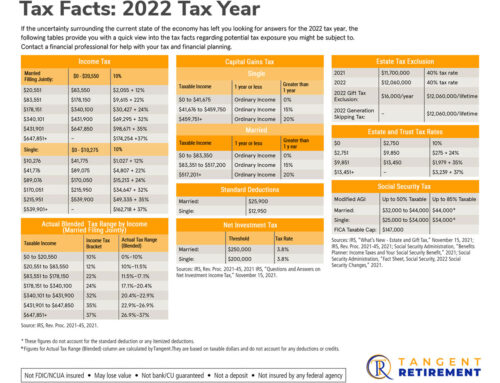 Strong economy growth in 2021 has led to marked inflation and returns on equities, bonds, and most other investments. For example, the S&P 500 rose 28.71% in comparison with inflation going up 7%. That trend has resulted in a clear Federal Reserve path to tighten monetary policy in an attempt to curb rampant inflation. That’s especially true after trends in January, in which the stock market slid over 10% in a single week – with no sign of inflation slowing. The result has been a Federal Reserve policy to tighten monetary policy to reduce inflation, by raising rates and tapering asset purchases.
Strong economy growth in 2021 has led to marked inflation and returns on equities, bonds, and most other investments. For example, the S&P 500 rose 28.71% in comparison with inflation going up 7%. That trend has resulted in a clear Federal Reserve path to tighten monetary policy in an attempt to curb rampant inflation. That’s especially true after trends in January, in which the stock market slid over 10% in a single week – with no sign of inflation slowing. The result has been a Federal Reserve policy to tighten monetary policy to reduce inflation, by raising rates and tapering asset purchases.
Now, with significant speculation about whether the Fed will take away liquidity quickly, the market might underperform. That creates significant risks for investors this year. While short term U.S. Treasury yields could rise significantly, flattening the curve.
Fed Actions:
- Speed up tapering of asset purchases
- Start a significant rate hike cycle (likely as much as 3-4 .25% increases in 2022)
Fed May Move Faster than Predicted
The current expectation is that the Federal Reserve will act and rapidly. The January timetable for tapering asset purchasing through June seems unlikely to be maintained. Instead, the Fed is likely to shorten that to March – which will start a rate hike cycle earlier than expected. This could have significantly more impact on the market than a slower-paced tightening.
If the Fed reduces its bond buying policy faster, the market will likely see more volatility. That’s especially true as central banks around the world react by withdrawing from covid stabilizing policies.
Federal Funds Rate long term target of 2.5%
While the Fed is expected to introduce 2-3 hikes in each 2022 and 2023, the Federal funds rate is expected to cap out at a 2.5%. That’s currently a net loss in comparison with inflation, which is substantially higher compared to recent years.
The Fed has also been discussing lowering the size of its balance sheet by letting bonds mature. That means that in addition to quantitative tightening, where the Fed stops buying bonds, it also intends to stop reinvesting. Effectively, its holdings will decline when bonds mature.
Omicron Causes More Uncertainty
 While many investors have been looking forward to a return to stabilization in 2022, Omicron created more challenges to the recovering economy. For example, economists now predict that the U.S. will lose jobs in both January and February. The Fed will be faced with the choice of raising interest rates in March, despite rising unemployment. That could prove a further detractor on the markets, with further volatility to be expected.
While many investors have been looking forward to a return to stabilization in 2022, Omicron created more challenges to the recovering economy. For example, economists now predict that the U.S. will lose jobs in both January and February. The Fed will be faced with the choice of raising interest rates in March, despite rising unemployment. That could prove a further detractor on the markets, with further volatility to be expected.
Atlanta Fed President Raphael Bostic suggests that its current policy will succeed or fail based on where Covid shifts. If it lets up and employment rises, the current pivot policy will be successful. The current policy is set to have the Fed stop its asset buying policy in March because of expected rises in interest rates, but with an expected loss of 300,000 jobs in January alone, that may be too early.
That could also prove an opportunity for some investors. For example, in 2013, the Feds tapering resulted in a 5.8% drop in equities. But, for the rest of the year, the market was up 17.5%, or a strong return for investors prepared to act on the opportunity.
A History of Reversing Decisions
The Fed is by no means committed to one track. Instead, it has a long history of reversing course and making last minute adjustments in response to market turmoil. The most recent example of that is the Christmas Eve market route in 2018. Here, the Fed cut rates by 25 basis points, after a significant drop in market.
However, the January 2022 market is still significantly more stable. For example, DataTrek Research shows that the S&P 500 dropped 14.8% on December 24th, 2018, vs. 8.3% on January 24th. Similar trends are visible across most major markets. So, unless things escalate, it’s unlikely the Fed will react with a quick reversal of decision-making. However, it is clear that we can’t create solid predictions for the rest of the year.
Key Takeaways for Investors
Covid19 is bringing significant market upheaval and that is only going to get worse as the Fed continues its tapering policy. That’s especially true if it pairs with decreasing jobs – as the rising interest rates and lost jobs will hurt the economy significantly. Otherwise, there’s too much turmoil and not enough certainty in predicting exact actions from the Fed or the market.
Instead, for most investors, the best advice would be to stay the course and consider updates to your current allocation. Capitalizing on market drops by buying could well be a good investment, if past drops have been an indication. However, your actions should always depend on your specific goals and risk tolerance. In this case, with high inflation and low equity stability, it’s a good policy to review your portfolio with your asset manager and diversify as much as possible. That should hedge against the risks of market volatility.
Concerns over the last decade have largely centered around inflation being too low. But now, with inflation well over expected and desired norms, policy makers have shifted course. Critics judge that current Fed policies will not achieve that aim without significantly hurting the markets – but currently we must wait and see.
If you’d like custom advice for your portfolio, reach out to us. Tangent Retirement is dedicated to helping you and your investments. For us, that means diversifying, keeping an eye on the economy, and responding to shifts to protect your assets.
This information is for reference only and should be reviewed with a qualified professional as you situation may vary from others. Nothing mentioned above is a guarantee nor should this be considered advice.
Golden State does not and cannot deliver tax advice and the material herein is for information only. Please consult a qualified tax professional for opinions related to your particular situation.
Investment advisory services are offered through Golden State Equity Partners, LLC, an investment adviser registered with the U.S. Securities and Exchange Commission. Tangent Retirement is a DBA of Golden State Equity Partners, LLC.



